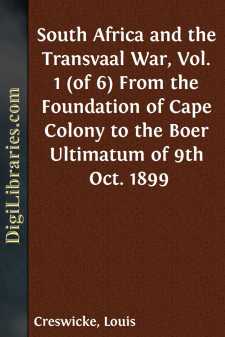History
- Africa 30
- Americas (North Central South West Indies) 50
- Ancient 68
- Asia 58
- Australia & New Zealand 8
- Canada 41
- Caribbean & West Indies 1
- Civilization 20
- Eastern Europe 12
- Europe 310
- Expeditions & Discoveries 60
- General 77
- Historical Geography 1
- Jewish 9
- Latin America 3
- Medieval 8
- Middle East 13
- Military 248
- Revolutionary 8
- Study & Teaching 5
- United States 353
- Western Europe 56
- World 13
History Books
Sort by:
uring the eighteenth century a remarkable change swept over Europe. The dominant spirit of the time ceased to be artistic as in the Renaissance, or religious as in the Reformation, or military as during the savage civil wars that had followed. The central figure of the world was no longer a king, nor a priest, nor a general. Instead, the man on whom all eyes were fixed, who towered above his fellows,...
more...
MOBILISATION AND TRAINING Late in the afternoon of August 2nd, 1914, the 4th Royal Berks Regiment joined the remainder of the South Midland Infantry Brigade for their annual camp on a hill above Marlow. War had broken out on the previous day between Germany and Russia, and few expected that the 15 days' training would run its normal course. It was not, therefore, a complete surprise when in the...
more...
eorge Washington, the Father of his Country, is equally the Father of Pittsburgh, for he came thither in November, 1753, and established the location of the now imperial city by choosing it as the best place for a fort. Washington was then twenty-one years old. He had by that time written his precocious one hundred and ten maxims of civility and good behavior; had declined to be a midshipman in the...
more...
THE RIGHT OF SLAVERY. INTRODUCTION. African Slavery is, at present, the subject of all-absorbing interest to the American mind; for, our people, almost intoxicated with their own freedom, seem unsatisfied with those manifold blessings acquired by the labors of their sires; and while they are conscious of not excelling them in wisdom, virtue, or valor, they are becoming ideal, and seem willing to...
more...
by:
Louis Creswicke
INTRODUCTION The Transvaal War—like a gigantic picture—cannot be considered at close quarters. To fully appreciate the situation, and all that it embraces, the critic must stand at a suitable distance. He must gaze not merely with the eye of to-day, or even of the whole nineteenth century, but with his mind educated to the strange conditions of earlier civilisation. For in these conditions will be...
more...
CATALOGUE OF LINGUISTIC MANUSCRIPTS IN THE LIBRARYOF THE BUREAU OF ETHNOLOGY. By James C. Pilling. Mr. Henry R. Schoolcraft, while engaged in the preparation of his work—"Information respecting the History, Condition, and Prospects of the Indian Tribes of the United States"—sent to various persons residing among the Indians a "Comparative Vocabulary of the Languages of the Indian Tribes...
more...
District Clerk's Office. (L. S.)Be it remembered, that on the sixth day of March, A. D. 1816, and in the fortieth year of the Independence of the United States of America, Rowe & Hooper, of the said District have deposited in this Office, the title of a book, the right whereof they claim as Proprietors, in the words following, to wit: "A Journal of a Young Man of Massachusetts, late a...
more...
2d March 1863.—I left England in the royal mail steamer Atrato, and arrived at St Thomas on the 17th. 22d March.—Anchored at Havana at 6.15 a.m., where I fell in with my old friend, H.M.'s frigate Immortalité. Captain Hancock not only volunteered to take me as his guest to Matamoros, but also to take a Texan merchant, whose acquaintance I had made in the Atrato. This gentleman's name is...
more...
PREFACE In republishing these essays in collected form, it has seemed best to issue them as they were originally printed, with the exception of a few slight corrections of slips in the text and with the omission of occasional duplication of language in the different essays. A considerable part of whatever value they may possess arises from the fact that they are commentaries in different periods on the...
more...
by:
Mme. Du Hausset
"The dismissal of M. Necker irritated the people beyond description. They looked upon themselves as insulted in their favourite. Mob succeeded mob, each more mischievous and daring than the former. The Duc d'Orleans continued busy in his work of secret destruction. In one of the popular risings, a sabre struck his bust, and its head fell, severed from its body. Many of the rioters (for the...
more...











